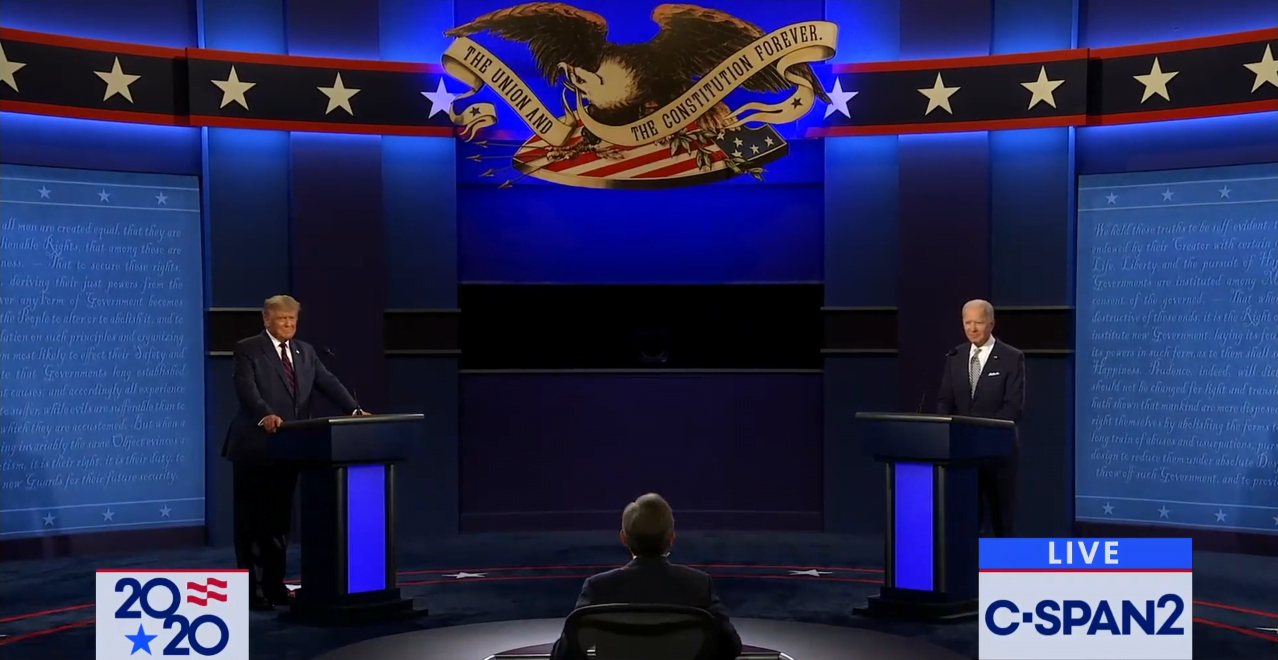
Q2 2020 hedge fund letters, conferences and more
Post-Debate Notes
With the first Trump-Biden debate of 2020 in the books, we've headed into the final stretch of the 2020 election. Let's assess what happened, note the election risk, and then look at how to protect against it.
What Happened
- Biden goes the distance. The former Vice President beat expectations by lasting the full 90 minutes and not appearing senile. He was able to recite his talking points.
- Biden gets bailed out. When Biden seemed at a loss for words (such as when President Trump asked him which police union had endorsed him), he got bailed out. In that particular case, the moderator, Chris Wallace, bailed him out. In other cases, Trump bailed Biden out by answering his own question instead of letting Biden freeze.
- Trump looked stronger, more aggressive. That caudillo energy helped him with Hispanic voters, judging by Telemundo's Twitter poll.
?? #Decision2020: ¿Quién ganó el #PrimerDebate presidencial?#PresidentialDebate #PresidentialDebates2020
— Noticias Telemundo (@TelemundoNews) September 30, 2020
Best Moments
- Biden's best moment (with respect to his base): was probably him saying "Will you shut up, man?" while deflecting Trump's questions about whether Biden would pack the Supreme Court.
- Trump's best moment: Pivoting to Hunter when Biden tried to waive the bloody shirt about his other son, the late Beau.
— David Pinsen (@dpinsen) September 30, 2020
Chris Buskirk zeroed in on that moment as well in his column for The Critic:
Trauma mining to score points in a debate is a desperately cynical piece of political theater... It was pure Biden: scripted, saccharine, playing by the rules of a game that has long since ended. In case you think I’m too cynical, that surely this couldn’t have been orchestrated, Joe Biden’s official Twitter account posted a photo of Joe and Beau with the caption, “Beau was not a loser” just as the debate ended.
And just so, Trump. He looked at his podium and quietly, respectfully, asked, which son Biden was talking about. Of course, he knew, but he played the game forcing Biden to respond, Beau. “Oh, I don’t know him. I know Hunter.”
And then listed the accusations against Hunter: he took a $1.5 billion investment from China into the fledgling investment company he ran with John Kerry’s son while his father was Vice President and en route to China. He received $3.5 million from the mayor of Moscow. He had a sinecure from a Ukranian energy company while his father was Obama’s pointman on Ukraine policy. (NB: Hunter had no experience in business let along the energy business.) It was as sweet a move as I’ve ever seen. The knockout punch was coming with all the force Joe Biden could muster and Trump simply sidestepped it and counterpunched.
Election Risk
A couple of weeks ago, a Finnish business journalist asked me which candidate would be worse for the market. I told her that the risk in the near term wasn't either candidate winning, but neither candidate winning: that the best thing for near term returns was a decisive election night victory. In a Wednesday article ("As Election Looms, Investors See Uncertainty. They Don't Like It."), investment professionals interviewed by the New York Times made similar points. For example:
“The single biggest comment that I hear is, ‘I want an election, I want a result of an election that is so clear that it can’t really be contested,’” said Doug Rivelli, president of the institutional brokerage firm Abel Noser in New York.
In the same article, Steve Sosnick, chief strategist at Interactive Brokers, raised the prospect of force being used to decide the issue:
I can’t remember a time where U.S. citizens had to worry about whether there would be a peaceful transfer of power, and whether all parties would have any doubt in accepting the electoral results.
Hedging Election Risk
If you're concerned that chaos might escalate after an unresolved election, below is a way you can limit your risk.
In that video, we use optimal puts on QQQ as a way to hedge market risk, for a tech-heavy investor. Investors who aren't as tech-heavy can use a similar approach with other index ETFs such as SPY.




